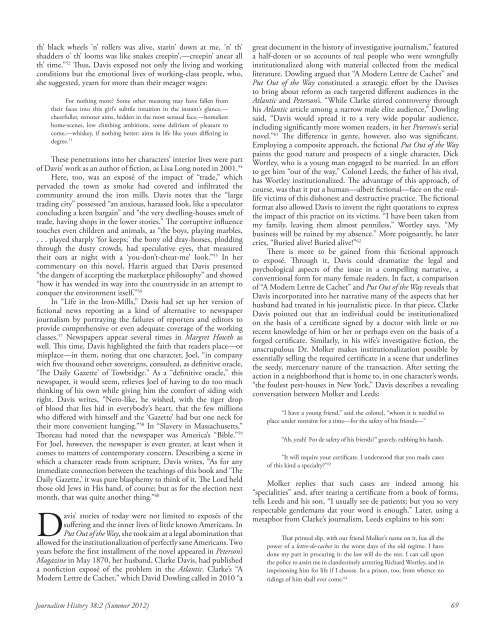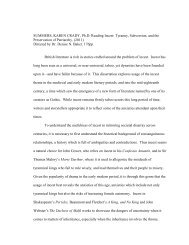Stories of Today: Rebecca Harding Davis' Investigative Fiction
Stories of Today: Rebecca Harding Davis' Investigative Fiction
Stories of Today: Rebecca Harding Davis' Investigative Fiction
You also want an ePaper? Increase the reach of your titles
YUMPU automatically turns print PDFs into web optimized ePapers that Google loves.
th’ black wheels ’n’ rollers was alive, starin’ down at me, ’n’ th’<br />
shadders o’ th’ looms was like snakes creepin’,—creepin’ anear all<br />
th’ time.” 52 Thus, Davis exposed not only the living and working<br />
conditions but the emotional lives <strong>of</strong> working-class people, who,<br />
she suggested, yearn for more than their meager wages:<br />
For nothing more? Some other meaning may have fallen from<br />
their faces into this girl’s subtile intuition in the instant’s glance,—<br />
cheerfuller, remoter aims, hidden in the most sensual face,—homeliest<br />
home-scenes, low climbing ambitions, some delirium <strong>of</strong> pleasure to<br />
come,—whiskey, if nothing better: aims in life like yours differing in<br />
degree. 53<br />
These penetrations into her characters’ interior lives were part<br />
<strong>of</strong> Davis’ work as an author <strong>of</strong> fiction, as Lisa Long noted in 2001. 54<br />
Here, too, was an exposé <strong>of</strong> the impact <strong>of</strong> “trade,” which<br />
pervaded the town as smoke had covered and infiltrated the<br />
community around the iron mills. Davis notes that the “large<br />
trading city” possessed “an anxious, harassed look, like a speculator<br />
concluding a keen bargain” and “the very dwelling-houses smelt <strong>of</strong><br />
trade, having shops in the lower stories.” The corruptive influence<br />
touches even children and animals, as “the boys, playing marbles,<br />
. . . played sharply ‘for keeps;’ the bony old dray-horses, plodding<br />
through the dusty crowds, had speculative eyes, that measured<br />
their oats at night with a ‘you-don’t-cheat-me’ look.” 55 In her<br />
commentary on this novel, Harris argued that Davis presented<br />
“the dangers <strong>of</strong> accepting the marketplace philosophy” and showed<br />
“how it has wended its way into the countryside in an attempt to<br />
conquer the environment itself.” 56<br />
In “Life in the Iron-Mills,” Davis had set up her version <strong>of</strong><br />
fictional news reporting as a kind <strong>of</strong> alternative to newspaper<br />
journalism by portraying the failures <strong>of</strong> reporters and editors to<br />
provide comprehensive or even adequate coverage <strong>of</strong> the working<br />
classes. 57 Newspapers appear several times in Margret Howth as<br />
well. This time, Davis highlighted the faith that readers place—or<br />
misplace—in them, noting that one character, Joel, “in company<br />
with five thousand other sovereigns, consulted, as definitive oracle,<br />
‘The Daily Gazette’ <strong>of</strong> Towbridge.” As a “definitive oracle,” this<br />
newspaper, it would seem, relieves Joel <strong>of</strong> having to do too much<br />
thinking <strong>of</strong> his own while giving him the comfort <strong>of</strong> siding with<br />
right. Davis writes, “Nero-like, he wished, with the tiger drop<br />
<strong>of</strong> blood that lies hid in everybody’s heart, that the few millions<br />
who differed with himself and the ‘Gazette’ had but one neck for<br />
their more convenient hanging.” 58 In “Slavery in Massachusetts,”<br />
Thoreau had noted that the newspaper was America’s “Bible.” 59<br />
For Joel, however, the newspaper is even greater, at least when it<br />
comes to matters <strong>of</strong> contemporary concern. Describing a scene in<br />
which a character reads from scripture, Davis writes, “As for any<br />
immediate connection between the teachings <strong>of</strong> this book and ‘The<br />
Daily Gazette,’ it was pure blasphemy to think <strong>of</strong> it. The Lord held<br />
those old Jews in His hand, <strong>of</strong> course; but as for the election next<br />
month, that was quite another thing.” 60<br />
Davis’ stories <strong>of</strong> today were not limited to exposés <strong>of</strong> the<br />
suffering and the inner lives <strong>of</strong> little known Americans. In<br />
Put Out <strong>of</strong> the Way, she took aim at a legal abomination that<br />
allowed for the institutionalization <strong>of</strong> perfectly sane Americans. Two<br />
years before the first installment <strong>of</strong> the novel appeared in Peterson’s<br />
Magazine in May 1870, her husband, Clarke Davis, had published<br />
a nonfiction exposé <strong>of</strong> the problem in the Atlantic. Clarke’s “A<br />
Modern Lettre de Cachet,” which David Dowling called in 2010 “a<br />
great document in the history <strong>of</strong> investigative journalism,” featured<br />
a half-dozen or so accounts <strong>of</strong> real people who were wrongfully<br />
institutionalized along with material collected from the medical<br />
literature. Dowling argued that “A Modern Lettre de Cachet” and<br />
Put Out <strong>of</strong> the Way constituted a strategic effort by the Davises<br />
to bring about reform as each targeted different audiences in the<br />
Atlantic and Peterson’s. “While Clarke stirred controversy through<br />
his Atlantic article among a narrow male elite audience,” Dowling<br />
said, “Davis would spread it to a very wide popular audience,<br />
including significantly more women readers, in her Peterson’s serial<br />
novel.” 61 The difference in genre, however, also was significant.<br />
Employing a composite approach, the fictional Put Out <strong>of</strong> the Way<br />
paints the good nature and prospects <strong>of</strong> a single character, Dick<br />
Wortley, who is a young man engaged to be married. In an effort<br />
to get him “out <strong>of</strong> the way,” Colonel Leeds, the father <strong>of</strong> his rival,<br />
has Wortley institutionalized. The advantage <strong>of</strong> this approach, <strong>of</strong><br />
course, was that it put a human—albeit fictional—face on the reallife<br />
victims <strong>of</strong> this dishonest and destructive practice. The fictional<br />
format also allowed Davis to invent the right quotations to express<br />
the impact <strong>of</strong> this practice on its victims. “I have been taken from<br />
my family, leaving them almost penniless,” Wortley says. “My<br />
business will be ruined by my absence.” More poignantly, he later<br />
cries, “Buried alive! Buried alive!” 62<br />
There is more to be gained from this fictional approach<br />
to exposé. Through it, Davis could dramatize the legal and<br />
psychological aspects <strong>of</strong> the issue in a compelling narrative, a<br />
conventional form for many female readers. In fact, a comparison<br />
<strong>of</strong> “A Modern Lettre de Cachet” and Put Out <strong>of</strong> the Way reveals that<br />
Davis incorporated into her narrative many <strong>of</strong> the aspects that her<br />
husband had treated in his journalistic piece. In that piece, Clarke<br />
Davis pointed out that an individual could be institutionalized<br />
on the basis <strong>of</strong> a certificate signed by a doctor with little or no<br />
recent knowledge <strong>of</strong> him or her or perhaps even on the basis <strong>of</strong> a<br />
forged certificate. Similarly, in his wife’s investigative fiction, the<br />
unscrupulous Dr. Molker makes institutionalization possible by<br />
essentially selling the required certificate in a scene that underlines<br />
the seedy, mercenary nature <strong>of</strong> the transaction. After setting the<br />
action in a neighborhood that is home to, in one character’s words,<br />
“the foulest pest-houses in New York,” Davis describes a revealing<br />
conversation between Molker and Leeds:<br />
“I have a young friend,” said the colonel, “whom it is needful to<br />
place under restraint for a time—for the safety <strong>of</strong> his friends—”<br />
“Ah, yeah! For de safety <strong>of</strong> his friends?” gravely, rubbing his hands.<br />
“It will require your certificate. I understood that you made cases<br />
<strong>of</strong> this kind a specialty?” 63<br />
Molker replies that such cases are indeed among his<br />
“specialities” and, after tearing a certificate from a book <strong>of</strong> forms,<br />
tells Leeds and his son, “I usually see de patients; but you so very<br />
respectable gentlemans dat your word is enough.” Later, using a<br />
metaphor from Clarke’s journalism, Leeds explains to his son:<br />
That printed slip, with our friend Molker’s name on it, has all the<br />
power <strong>of</strong> a lettre-de-cachet in the worst days <strong>of</strong> the old regime. I have<br />
done my part in procuring it: the law will do the rest. I can call upon<br />
the police to assist me in clandestinely arresting Richard Wortley, and in<br />
imprisoning him for life if I choose. In a prison, too, from whence no<br />
tidings <strong>of</strong> him shall ever come. 64<br />
Journalism History 38:2 (Summer 2012)<br />
69
















